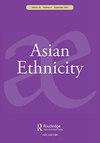Subject and citizen: the ‘Sikkim Subject’ in Indian democracy
IF 0.8
Q3 ETHNIC STUDIES
引用次数: 1
Abstract
ABSTRACT The paper deals with the empirical category of Sikkim Subject, now a special category of Indian citizens. It traces the path of the citizenship project in Sikkim, which remained insulated from the processes of India’s citizenship regime from 1975. The paper further analyses evolving citizenship discourse from the framework of acquiring citizenship through the incorporation of foreign territories by India after the commencement of the Indian Constitution, 1950, and the Indian Citizenship Act, 1955. One such encounter, the Sikkim Citizenship Order of 1975, highlights the evolving tensions associated with the practical imperatives of Indian citizenship often exacerbated by anti-immigrant movements in parts of North East India. The paper argues that Indian citizenship, liberal in its foundations, which situates individual equality as the unit of citizenship analysis converge with the differentiated model of citizenship with group and community-cultural rights in a historical specificity in Sikkim.主体与公民:印度民主的“锡金主体”
锡金主体是印度公民的一个特殊范畴。它追溯了锡金公民项目的发展历程,该项目自1975年以来一直与印度公民制度的进程隔绝。本文进一步分析了1950年《印度宪法》和1955年《印度公民法》生效后,印度通过并入外国领土获得公民身份的框架下不断演变的公民身份话语。1975年的锡金公民令就是这样一次遭遇,突显了与印度公民身份的实际要求相关的不断演变的紧张局势,而印度东北部部分地区的反移民运动往往加剧了这种紧张局势。本文认为,印度公民身份在其基础上是自由的,它将个人平等作为公民身份分析的单位,与锡金历史上特有的具有群体和社区文化权利的区别公民身份模式相一致。
本文章由计算机程序翻译,如有差异,请以英文原文为准。
求助全文
约1分钟内获得全文
求助全文
来源期刊

Asian Ethnicity
PHYSIOLOGY-
CiteScore
2.80
自引率
6.20%
发文量
27
期刊介绍:
In the twenty-first century ethnic issues have assumed importance in many parts of the world. Until recently, questions of Asian ethnicity and identity have been treated in a balkanized fashion, with anthropologists, economists, historians, political scientists, sociologists and others publishing their studies in single-discipline journals. Asian Ethnicity provides a cross-disciplinary, international venue for the publication of well-researched articles about ethnic groups and ethnic relations in the half of the world where questions of ethnicity now loom largest. Asian Ethnicity covers any time period, although the greatest focus is expected to be on the twentieth and twenty-first centuries.
 求助内容:
求助内容: 应助结果提醒方式:
应助结果提醒方式:


